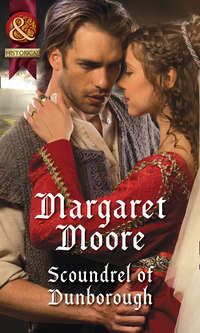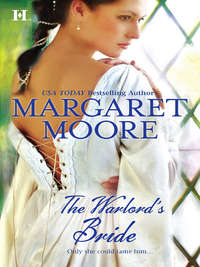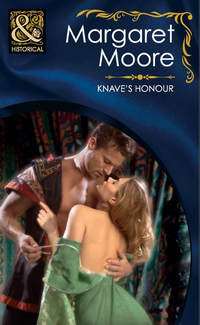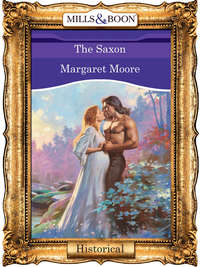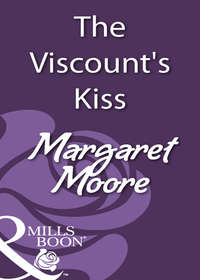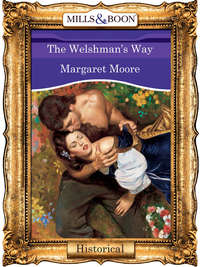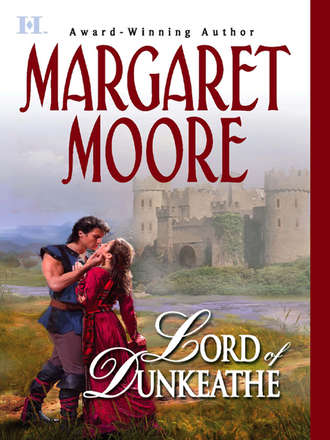
Полная версия
Lord of Dunkeathe
Robert frowned and studied the list in his hand.
“Does that present a problem?”
“Perhaps I can switch his chamber with that of Sir Percival de Surlepont.”
“That would put Sir Percival’s chamber next to mine?”
“Yes, my lord.”
“Very well. See that the change is made—and make it sound as if that was a mistake that had to be corrected, and that this is some sort of honor to Percival instead of an inconvenience, or being done in response to a complaint.”
“Yes, my lord.”
“Who did Percival bring?”
Robert’s gaze returned to the tablet. “His cousin, Lady Eleanor.” He raised his eyes to regard Nicholas. “Apparently he is her nearest male relation.”
“What’s she like?”
“Pretty and modest.”
Nicholas recalled the young women in the courtyard, but no one in particular came to mind. The only two women he could remember with any clarity were that bold maidservant and the haughty daughter of Lord Chesleigh. “How old is Lady Eleanor?”
“Seventeen.”
He didn’t want a girl for a wife, but a woman capable of taking responsibility and leadership of the household. He had no desire to have to deal with a shy, fearful bride on his wedding night, either.
That impertinent, brown-eyed maidservant with the thick braids down her back, and the little wisps of hair that escaped to dance upon her intelligent brow, wouldn’t be shy. His blood warmed as he imagined how she might react if he took her in his arms and captured her mouth with his.
“Sir Percival assured me her dowry would be substantial, my lord.”
Once again Nicholas commanded himself to stop thinking about that servant. “I’ve heard the family is quite rich.”
“Yes, my lord, they are, and a sizeable dowry will go a long way toward solving any difficulties…” Robert flushed and let the words trail off when he saw Nicholas’s disgruntled expression.
“We’ve enough ready coin to get us to Lammas and through a wedding, don’t we?” Nicholas asked. “The wool must have brought in something.”
“Yes, it did, my lord, but I must point out that the expense of this…this…”
“I have to entertain my guests in the style they expect,” Nicholas replied as Robert floundered for the word to describe his overlord’s method of finding a bride. “I won’t have them thinking I’m desperate—which I’m not.” Not yet, anyway. “It’s your responsibility to see that no one suspects I’m running short of funds.”
“You’re not yet in dire straits, my lord,” Robert assured him.
“Good. By Lammas I should have a bride in hand, or at least a betrothal agreement and promise of a dowry. Who else has come?”
“Lady Mary, the daughter of the Earl of Eglinburg, Lady Elizabeth, sister of the Duke of Ansley, Lady Catherine, daughter of the Comte D’Ortelieu, Lady Isabelle, ward of Sir James of Keswick, Lady Eloise, daughter of Sir George de Chillery, Lady Lavinia, second cousin to the Duc D’Anglevoix, Lady Priscilla, niece of the Abbot of St. Swithins-by-the-Sea who came with her brother Audric, and Lady Joscelind, daughter of Lord Chesleigh of Kent.”
Ah yes, the beautiful—and proud—Lady Joscelind and her equally proud and arrogant father. He wondered what they’d do when they discovered they’d been ordering their host about as if he were their lackey. That should prove interesting—although, given their natures, they might take offense that he hadn’t identified himself. He’d have to ensure that he gave them a believable explanation.
Nicholas strolled back to the window and saw that the maidservant was still standing by the cart. She shifted her feet, as if her patience was wearing thin. “That’s only nine,” he noted, glancing over his shoulder. “Who’s the tenth?”
“Nobody of any consequence, my lord. In fact, I probably should have denied them admittance to the courtyard, but the fellow did have a charter and you had said that all women of noble birth were to be considered. His niece meets that qualification.”
Nicholas raised an inquisitive brow, just as he had in the courtyard. That serving wench had then done the same, surprising and secretly amusing him more than he’d been amused in…well, a long time. “Who is this nobleman with a charter you don’t think should be here?”
“A Scot, my lord, the Thane of Glencleith. I asked those of our men who are Scots, and it seems he’s the holder of a small estate to the north. Politically, he’s completely unimportant, and I understand he’s quite poor.”
“Only one Scots noble came?”
“Yes, my lord.”
Only one—and he was a lord in this country. Clearly it didn’t matter to the Scots that he’d changed the name of his estate back to the original one, or that his sister had married into one of their clans. He was still, first and foremost, a representative of the Normans and their unwelcome intrusion into Scotland.
Yet whatever they thought, he’d earned Dunkeathe and recalcitrant Scots or no, he’d keep it. If he had to marry for money and influence to ensure that, he would.
A fist pounded on the door. Nicholas wheeled around just as the door flew open and a short, brawny, gray-haired, bearded, potbellied Scot wearing one of their skirted garments bustled into the room.
Before Nicholas could demand an explanation, the intruder came to a halt, put his hands on his hips, and smiled at them both. “Here you are!” he cried in heavily accented French. “Delighted to make your acquaintance, my lord. I thought you’d be in the courtyard greeting your guests, but obviously Normans have a different idea of politeness.”
He looked around the room before his gaze settled again on Nicholas. “Wonderful castle you’ve got here. This chamber’s a bit bare, but when you’re married, your wife will change that.”
Nicholas’s first thought was that the man was half-mad, while Robert looked like he was going to faint.
“My lord, I—I—” the steward stammered, clearly aghast and at a loss to explain what was happening.
The fellow seemed harmless, if audacious. “Welcome to Dunkeathe,” Nicholas replied, giving Robert a look to assure him he wasn’t angry.
Robert recovered the powers of speech. “My lord, this is Fergus Mac Gordon Mac Darbudh, the Thane of Glencleith.”
The poor, politically unimportant Scottish noble.
Whatever Nicholas thought of the man personally, and no matter how poor and seemingly unimportant he might be, Nicholas knew he had to be diplomatic. He’d lived in Scotland for a decade, and he still couldn’t fathom the complicated relationships between the clans. It could be that this man had relatives who were far more politically important than he himself.
Therefore, he put a smile on his face and calmly inquired, “Is there something I can do for you, my lord?”
“It’s not what you can do for me,” the boisterous Scot replied. “It’s what I can do for you. I’ve brought you the perfect bride.” He smiled with immense, and quite sincere, satisfaction. “My niece, Riona. She’s a very fine girl, my lord—no man could do better when it comes to marriage. She’s a sweet lass, and she’s been the joy of my life since she came to me when she was two years old and her sainted parents died.
“She’s run my household since she was twelve, too,” he continued before Nicholas or Robert could get a word in. “The servants follow her orders without question and while she keeps them in good order, they love her. I’ll wager there aren’t many Norman ladies so beloved by their servants as my Riona is.
“And she’s clever, too. She keeps all the accounts and knows where every penny’s spent. She’s saved me many a penny, too, I can tell you—although that won’t mean much to you, for there’s plenty in your purse, I know. But still, no man wants a wasteful wife. Granted she’s not got a large dowry, but what’s that to a man of your wealth, eh? What are a few more coins in the purse if your wife’s making your life a misery? Riona could never do that. She’ll be a bride any man could be proud of and I wouldn’t offer her up to just any man, either.”
With that, he folded his arms over his chest and beamed as if he’d just saved Nicholas from a fate worse than death.
Unfortunately for Fergus Mac Gordon, his niece could be the most wonderful of women, but if she was poor, she had no chance of becoming Nicholas’s bride. The personal attributes of his wife were considerably less important to him than the dowry she would bring.
Nevertheless, the man was probably as proud as all the Scots were, and he’d likely be insulted if Nicholas refused to consider his niece from the start, so he had best not be too quick to dismiss her.
“I thank you for bringing your niece to Dunkeathe,” he said politely, “and I’m sure she’s a very fine young woman. I assure you, I’ll take all the qualities of every lady into account before I make my choice. Now if you’ll excuse me, my steward and I have other matters to discuss.”
“Of course you do!” the Scot cried. To Nicholas’s relief, he didn’t seem a whit dismayed by this polite dismissal as he backed toward the door. “You’re a very busy fellow, I’m sure, with this great pile of a castle to tend to. So many soldiers, too—an army you’ve got, although who’d dare to attack you here? The man would have to be mad.”
Then, just as abruptly as he’d entered, he was gone.
It was like the calm after a maelstrom. Or before a storm.
“My lord, I do beg your pardon,” Robert said, clearly horrified by what had just happened. “I had no idea he’d do that, none whatsoever!”
At the sight of Robert’s red, indignant face Nicholas had to turn away and look out the window again, for he felt the most unusual urge to laugh.
He noticed the maidservant was still standing by the cart. “I take it you personally didn’t invite him to join us here?”
“Absolutely not, my lord!”
“Then it’s not your fault.”
“I’ll inform him at once that he cannot remain here, my lord.”
“I didn’t say he had to leave. He’s still the only noble Scot to come, and I don’t think it would be wise to do anything that might cause him to depart before I make my final choice. The ties of blood and family go deep in this country. He may be of little importance, but he might have relatives who are, and they could stand against me if he feels insulted.”
“I haven’t heard that he has any relatives who might cause us trouble, my lord.”
“The ties between clans are complicated. I can’t remember half the clans my sister’s related to now. It would be better to take no chances, so I should at least make it appear that I’m considering his niece.”
Suddenly, the stocky Scot came rushing into the courtyard and headed straight for the maidservant.
“Riona!” he called out, waving. She waved back and hurried toward him eagerly.
God’s rood, was that young woman the thane’s niece? That woman he’d been trying not to imagine in his bed?
“So, here you are, brother. I should have guessed you’d be holed up here instead of talking to the bevy of beauties who’ve come to vie for your hand.”
Nicholas briefly closed his eyes and prayed for patience before he turned around.
His younger brother strolled into the room and threw himself into Nicholas’s chair and put his feet on the table. Like his brother, Henry was strong and well-muscled, a warrior in his prime, and now he sat smiling smugly as if he had not a care in the world.
Which was quite probably true.
“You may leave us, Robert,” Nicholas said, subduing his envy of the brother who’d never shared his struggles.
“Yes, you may leave me to bid farewell to my brother,” Henry said with a wave of his hand, “although I must say, Nicholas, I’m rather tempted to stay a few more days. I had no idea your net would gather such a fine catch. Mind you, that one with the giggle…” He shuddered and shook his head. “Not quite what I’d want to wake up to every morning.”
“I didn’t think you cared who you woke up with as long as you’d enjoyed yourself the night before.”
Henry laughed. “Well, I’d care if she was my wife, which is why you won’t find me sending out word that I’m in the market for a bride, with all and sundry welcome to come and vie for my hand. Really, brother, you make it sound like you’re nothing more than a stallion ready for breeding.”
Nicholas took two long paces and swiped his brother’s feet from the table. “Keep your muddy boots on the floor.”
Henry regarded him with annoyance. “Pardon me for not realizing you were getting so fastidious in your old age.”
“That table cost more than I made the first six months of my service with the Duc D’Aubreay. You may be able to forget when we were poor, but I don’t.”
“I don’t forget.”
“Good.”
Henry got to his feet. “So I do understand why you want a rich wife from a well-connected family.” His temper, so easily roused, was dying down, as it always did. Eventually. “God’s blood, so do I. It’s the method I question, Nicholas.”
Nicholas poured himself some wine from the silver carafe. “I see nothing wrong with having women come to me, instead of running all over the countryside trying to find a bride.”
“I suppose it does make it easier—but wouldn’t it be cheaper to go to them?”
It certainly would, but Nicholas didn’t want anyone to realize he had financial troubles, not even Henry. “It’s not the expense.” He poured wine in another goblet and handed it to his brother. “I don’t want to be long from my estate.”
Henry took a drink and looked over the rim of the goblet at Nicholas. “If this were my estate, I’d get away as often as I could. The weather alone—”
“I don’t mind the rain, especially when I have a castle in which to dry off,” Nicholas replied as he sat in his chair.
“That does make a difference, I suppose,” Henry said, leaning back against the table. “But there’s the Scots to deal with. They’re stubborn and coarse, the lot of them.”
“That’s what Marianne said before she married one of them,” Nicholas noted. “Our sister seems quite happy now.”
Henry sniffed and took another drink of Nicholas’s fine wine. “She’s a woman, and we both know women are slaves to their hearts. Would you marry a Scot?”
“I’d certainly consider a Scot if she had a large dowry and was from an important family.”
“I really think you would at that.”
Nicholas’s temper flared. “I do live in their country, and it was a Scot who gave me this estate.”
Henry put the goblet down on the large table. “You’d better be careful, or you might wind up more Scots than Norman, like Marianne. You’ve already let your hair grow long, the way they do.”
“It saves time,” Nicholas replied. “However, I doubt I’ll ever be mistaken for a Scot, whoever I marry, and as for our sister, she seems content, and I’m happy to have her husband for an ally. I need all the allies I can get in this country.”
Henry, who wore his hair in the Norman fashion, took a long drink, then wiped his lips. “Surely the woman herself should count for something.”
“Naturally,” Nicholas said as he set down his goblet. “She’ll have to be able to run a household without pestering me about expenses or petty squabbles among the servants.”
“You must want her to be pretty,” Henry said. “Or do you intend never to see her by daylight? Or candlelight? Or torchlight?”
“Of course I don’t want to marry some old hag. But as long as she’s not repulsive, her looks are immaterial to me.”
Henry didn’t hide his skepticism. “You used to be more discerning. In fact, you used to be quite fussy in that regard. Considering this is a woman you’ll have to make love to several times if you’re to have heirs, I’m surprised to hear you claim otherwise.”
“All I wanted from a whore was to slake my lust. This is different.”
“Exactly,” Henry cried triumphantly, “because presumably, she’ll also be the mother of your children. You don’t want a bunch of ugly brats, do you?”
“I want my sons to be courageous, honorable men, and my daughters honorable, demure women—as their mother should be. What they look like is less important.”
“We’ll see how serious you are about your future wife’s appearance when you make your choice,” Henry said as he pushed himself away from the table. “Now give me your hand. It’s time I was on my way if I’m to reach Dunbardee before nightfall.”
Nicholas rose and clasped his brother by the forearm. “Safe journey, Henry.”
“If I hear anything of significance at court, I’ll send word,” Henry replied. “I do know what you did for me, Nicholas, and I won’t forget. Anything I can do to help you, I will.”
Nicholas regarded him with surprise, taken aback by this unexpected expression of sincere gratitude.
Henry sauntered to the door. “Farewell, brother.” He paused on the threshold and gave Nicholas a sarcastic smirk. “Whatever you do, don’t sell yourself short.”
The warmth engendered by Henry’s words of appreciation fled.
“I’m not selling myself.”
Henry replied with aggravating condescension. “Of course you are, just as the women will be. But there’s no need to lose your temper, brother. That’s the way of the world. Goodbye, and good luck.”
AFTER HENRY had left him, Nicholas again went to the window, hands clasped behind his back. The sun was past midday. Henry would have to ride swiftly if he was to reach Dunbardee. He’d enjoy that. Henry was young and he’d always been reckless—because he could afford to be. He hadn’t had to pay for their sister’s time in the convent. He hadn’t had to ensure that his brother had the best training and arms, while he managed with whatever he could afford after their needs were met. Henry had never slept in stables to save the cost of a night’s lodging at an inn, or gone without food.
Henry hadn’t been the one to promise their dying mother he would always look after his brother and sister, a vow he’d willingly made and done his best to keep.
Henry didn’t know that as the years of struggle had passed, Nicholas had vowed to do everything he could to rise in the world, to a place where he’d be rich and respected, safe and secure, where no one could take anything away from him, or threaten him or his family.
With that in mind, he’d trained and fought and won this estate by dint of his skill at arms alone, without the benefit of noble patronage or connections.
Yet even so, that wasn’t enough to rest and be content, not in this world. To hold it, he needed a rich wife from a powerful family.
And, by God, he’d get one.
CHAPTER THREE
JOINING HER UNCLE, Riona came out of the chamber made over to her use while they were in Dunkeathe. Together they were going to the hall to enjoy the special feast in celebration of St. John the Baptist’s Day and, so Uncle Fergus said, to welcome all the guests in fine Norman style.
Since their two small rooms were farthest from the hall, it made more sense to leave the building by the guarded outer door than go along the upper corridor. Riona suspected their rooms were really intended for the body servants of the household or the guests and had been pressed into service because so many had come to Dunkeathe.
The size and location didn’t trouble her a bit. The chambers were more than large enough for herself and Uncle Fergus, and they had the additional virtue of privacy. At home, she shared a teach with several other women of the household; here, since she had no maid, she had the chamber to herself. Tonight, she wouldn’t have to listen to Maeve snore, or hear Aelean get up to use the chamber pot. She wouldn’t be bothered by Seas and Sile whispering for what seemed an age before they fell asleep. Tonight, she would be blissfully alone, in welcome silence.
“I wonder what they’ll feed us,” Uncle Fergus mused as they strolled through the courtyard. “I’ve heard the Normans drown everything in spicy sauces.”
“I’m sure there’ll be something we’ll like,” Riona assured him as she linked her arm though his.
The air carried a whiff of smoke from the bonfires being kindled in the village to celebrate Midsummer’s Day.
“Aye, I suppose,” her uncle replied. He slid her a wry glance. “I’m also wondering what you’ll think of Sir Nicholas.”
Riona tried not to betray any reaction at all, but she couldn’t subdue a blush. “He’s probably a very impressive soldier.”
“Oh, aye, he’s very impressive. A fine fellow.”
Uncle Fergus looked particularly pleased, as if he were contemplating a great secret. Her suspicions aroused, she immediately asked, “Did you meet him?”
And if so, what did Sir Nicholas say to you?
Instead of answering her question, Uncle Fergus ran a studious gaze over her simple dark green woolen dress. “I should have bought you a new gown.”
“This is more than good enough,” she said, smoothing down the gown with her hand. “I’d feel uncomfortable in silk or damask or brocade. Did you meet Sir Nicholas earlier?”
“Something smells good,” Uncle Fergus noted as he pushed open the doors of the hall and ushered her inside, still not answering her question.
Which was momentarily forgotten when Riona entered the magnificent, and crowded, hall. It was easily sixty feet long and thirty feet wide, with a raised dais at the farthest end and pillars down its length to support the high roof. Wide beams rested on corbels carved to resemble the heads of various animals. A long table covered in white linen stood on the dais, along with carved chairs. A colorful tapestry hung behind it, and more decorated the walls. The rushes beneath her feet released the odor of rosemary and fleabane.
More than finely dressed nobles filled the room and created the noise. Here, as in the courtyard, what seemed a bevy of servants hurried through the hall, some still setting up tables and covering them with linen, others lighting torches. Hounds wandered about, snuffling at the rushes and looking around expectantly, often in the direction of a door that led to the kitchen, for wonderful odors wafted to her from that direction.
More than once the servants collided, argued and cast annoyed looks at their fellows. A few of the younger servants appeared utterly confused, and had to be pointedly reminded about what they were to do.
There was no woman who seemed to be in any position of authority here, only the steward they’d met at the gate. Standing in the corner near the dais, he looked harried and rather lost. Obviously he wasn’t prepared for this responsibility, or maybe he was overwhelmed by the number of guests.
She could have told him that the tables should have been set up much earlier, with the linens to come shortly before the meal was served. More specific directions would help bring better order to the rest of the activity, and the younger servants should only be entrusted with the most basic of duties.
She wondered how well the kitchen servants were organized, until it occurred to her that none of this was her concern. She was a guest here, like all the other nobles.
Suddenly, everyone simultaneously stopped talking and moving, and turned to look at her and Uncle Fergus. Disappointment flickered across their faces and was soon replaced by scorn and derision.
“I suppose they were expecting Sir Nicholas,” Uncle Fergus remarked. He didn’t seem to notice that people were looking at them as if they were spattered with mud. Or dung. “I don’t see him here, but there’s Fredella.”
He smiled at a woman dressed in a plain gown of dark blue wool, with a simple leather girdle about her ample waist, and a square of linen on her head. Her garments, as well as her friendly face, suggested to Riona that she wasn’t a lady, but perhaps a servant of one of them. Either that, or they weren’t the only poor nobles who’d come to Dunkeathe.
Whoever she was, it was like Uncle Fergus to make friends with anyone and everyone, rich or poor, peasant or noble—another reason she loved him.
“She’s the servant of Lady Eleanor, the cousin of Sir Percival de Surlepont,” Uncle Fergus explained, nodding at a man on the other side of the hall. “He’s that overdressed puppy we saw in the courtyard and that’s Lady Eleanor beside him.”


